
John Deere’s $20 billion pledge to expand U.S. operations delivers a resounding win for American workers and manufacturing, directly challenging decades of globalist outsourcing and government neglect.
Story Snapshot
- John Deere will invest $20 billion to strengthen its U.S. workforce and manufacturing footprint.
- This expansion secures jobs for 30,000 Americans at over 60 domestic locations.
- The company’s commitment stands out against years of industry outsourcing and automation-driven layoffs.
- Deere’s growth reinforces American industrial independence and rural economic stability.
John Deere’s Investment Signals a Shift Toward American Manufacturing
Deere & Company, known for its iconic green and yellow branding, has announced a $20 billion investment in U.S. operations—an unprecedented move in the current industrial climate. With more than 60 locations and a workforce of 30,000 Americans, the company’s commitment to domestic manufacturing runs counter to a trend of outsourcing and automation that has plagued the sector for decades. This expansion is designed to bolster American jobs and secure critical supply chains, directly supporting rural communities and the agricultural backbone of the nation.
The investment will fund facility upgrades, workforce training, and the deployment of cutting-edge technologies such as autonomous tractors and precision agriculture solutions. By prioritizing U.S. manufacturing, Deere is giving American workers real opportunities for advancement while ensuring equipment vital to farming and construction is built on American soil. This strategy not only meets the needs of farmers and contractors but also safeguards the economic health of numerous local communities dependent on Deere’s operations.
Historical Roots and Enduring Economic Impact
Founded in 1837 by Vermont-born blacksmith John Deere, the company revolutionized farming with the self-scouring steel plow. Over time, it expanded from simple plows to a broad range of agricultural, construction, and forestry machinery. Strategic decisions—including relocation to Moline, Illinois for better distribution and the acquisition of Waterloo Gasoline Engine Company—cemented Deere’s legacy as a manufacturing giant. Today, John Deere remains a major employer, providing stable, well-paying jobs, and driving innovation across the U.S. industrial landscape.
Throughout its history, Deere has weathered labor disputes, union negotiations, and fierce global competition. Its resilience and commitment to quality have enabled the company to maintain strong ties with American farmers, contractors, and local economies. By investing in the domestic workforce and facilities, Deere not only honors its heritage but also sets a powerful example for other manufacturers, strengthening the nation’s industrial independence and economic sovereignty.
Stakeholders, Power Dynamics, and Conservative Values
Key stakeholders include Deere’s corporate leadership, its unionized and non-union workforce, American farmers, suppliers, and rural communities. The company’s market dominance gives it leverage over suppliers and dealers, while management-union relations remain pivotal, especially during contract negotiations. Deere’s focus on U.S. jobs aligns with conservative values—individual liberty, limited government intervention, and support for American families—by rejecting globalist pressures and prioritizing the domestic economy. The expansion cements traditional principles of hard work and self-reliance, providing a bulwark against policies that have eroded manufacturing and family livelihoods in recent decades.
Long-Term Implications and Industry Leadership
In the short term, John Deere’s investment guarantees job security for tens of thousands of Americans and brings economic benefits to communities nationwide. Over the long haul, the infusion of capital into U.S. operations may inspire other manufacturers to follow suit, reversing years of offshoring and automation-driven job losses. Deere’s leadership in agricultural technology and commitment to workforce development set industry benchmarks, driving productivity and sustainability without sacrificing American jobs. This approach reaffirms faith in the nation’s manufacturing capabilities and rejects government overreach in favor of free enterprise and individual opportunity.
John Deere pledges to pour $20B into its US operations to ‘continue building and investing in America’ https://t.co/050NFJjyJs pic.twitter.com/epjxxV2Cmm
— NY Post Business (@nypostbiz) August 9, 2025
Expert analysis consistently highlights Deere’s historical importance and adaptability, noting its significant role in shaping rural economies and pioneering innovation in industrial equipment. While some express concerns about automation’s impact on employment, Deere’s focus on workforce training and facility expansion directly addresses these challenges, providing a model for balancing technological progress with job preservation. The company’s unwavering commitment to building and investing in America offers hope to those frustrated by past policies that have undermined constitutional rights and conservative values.
Sources:
Deere & Company: Shaping the Future of Agriculture Since 1837
John Deere History – MachineFinder
From Steel Plow to Tractor: A History of John Deere and His Company











